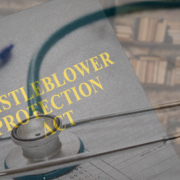Anti-Retaliation Rights for Whistleblowers Who Report Misconduct
Whistleblowers are an integral part of safety and accountability in organizations in the United States. When public agencies or private companies engage in unethical or illegal behavior, it often takes the actions of someone on the inside to bring that behavior to light. Unfortunately, whistleblowers often pay a steep price for their commitment to doing what’s right. Whistleblowers are routinely fired, demoted, or otherwise retaliated against for their actions.
Luckily, there are options for whistleblowers who have been targeted by their employers. If you’ve been the victim of retaliation, let’s talk to understand the anti-retaliation rights. Call Coumanis & York at 251-336-3121 to set up a free consultation with our team now.
Legal Protections for Whistleblowers
There are many laws in place to protect whistleblowers from mistreatment by employers. The reason for this is simple: when left to their own devices, employers routinely make the wrong choices. When employers have the freedom to fire those who have brought injustices to light, there’s no reason for employees to blow the whistle on illegal behavior. These protections ensure that employees have the freedom and protection they need to report illegal behavior. Some relevant legislation includes:
-
Whistleblower Protection Act:
The Whistleblower Protection Act is a federal law that protects federal employees and applicants from retaliation when they report illegal behavior.
-
False Claims Act:
Another relevant law is the False Claims Act. It allows whistleblowers to sue companies or entities that are defrauding the government. The whistleblower can recover compensation on the government’s behalf. Under the FCA, whistleblowers receive protection from retaliation and financial compensation for funds recovered.
-
OSHA regulations:
OSHA offers whistleblower protections in a wide range of industries. These protections are meant to safeguard those who report safety violations and other dangerous behavior in their workplace.
-
Dodd-Frank Wall Street Reform and Consumer Protection Act
: Under this legislation, those who report securities violations are entitled to both financial incentives and protection from retaliation.
There are numerous other federal and state laws protecting whistleblowers. If you’re witness to illegal or unethical behavior at your place of employment, but you’re concerned about losing your job if you report it, it’s important to talk to an attorney about legal protections and options available to you.
Recognizing and Defining Retaliation
If you’ve reported your workplace and you’re unsure if you’re the victim of retaliation, keep reading. It’s crucial to understand the wide range of behaviors that count as retaliation. Common forms of retaliation include:
- Termination: This is the most widespread form of retaliation. Many employers simply fire whistleblowers.
- Demotion: Loss of job responsibilities and raises are also common for whistleblowers.
- Loss of hours: Whistleblowers may face reduced hours or be forced to work less desirable hours than they did before.
- PIP or poor evaluations: It’s not uncommon for whistleblowers to receive negative performance evaluations out of nowhere after reporting their place of employment. They may also be placed on a performance improvement plan despite a consistent history of strong performance.
- Change in job description and duties: If you’re suddenly taken away from your main work duties and forced to do less desirable tasks, your company could be trying to push you out.
- Isolation: Whistleblowers often find themselves kept away from colleagues and others within the company, perhaps to keep them from talking about what they reported.
- Blacklisting in the industry: After reporting their place of employment, whistleblowers may find it hard to get a new job within their industry. Many employers retaliate by getting whistleblowers blacklisted at other major companies in their field.
- Harassment: Harassment and other forms of hostility can cause significant stress and trauma for whistleblowers.
Remedies for Whistleblowers Targeted by Management
Whistleblowers enjoy protection under numerous state and federal laws. However, many employees do not know that—and that’s what employers are counting on. They expect wrongfully terminated employees to just disappear into the shadows without causing further issues. There are different remedies you may seek, from financial damages and reinstatement to your previous position to complaints to regulatory agencies. Working with an employment lawyer can help you decide your next steps.
Protect Your Rights with Coumanis & York
If your employer has retaliated against you after you’ve made a complaint, don’t wait any longer to explore your legal options. Let’s talk about what comes next—reach out to us online or call us at 251-336-3121 today.









Leave a Reply
Want to join the discussion?Feel free to contribute!